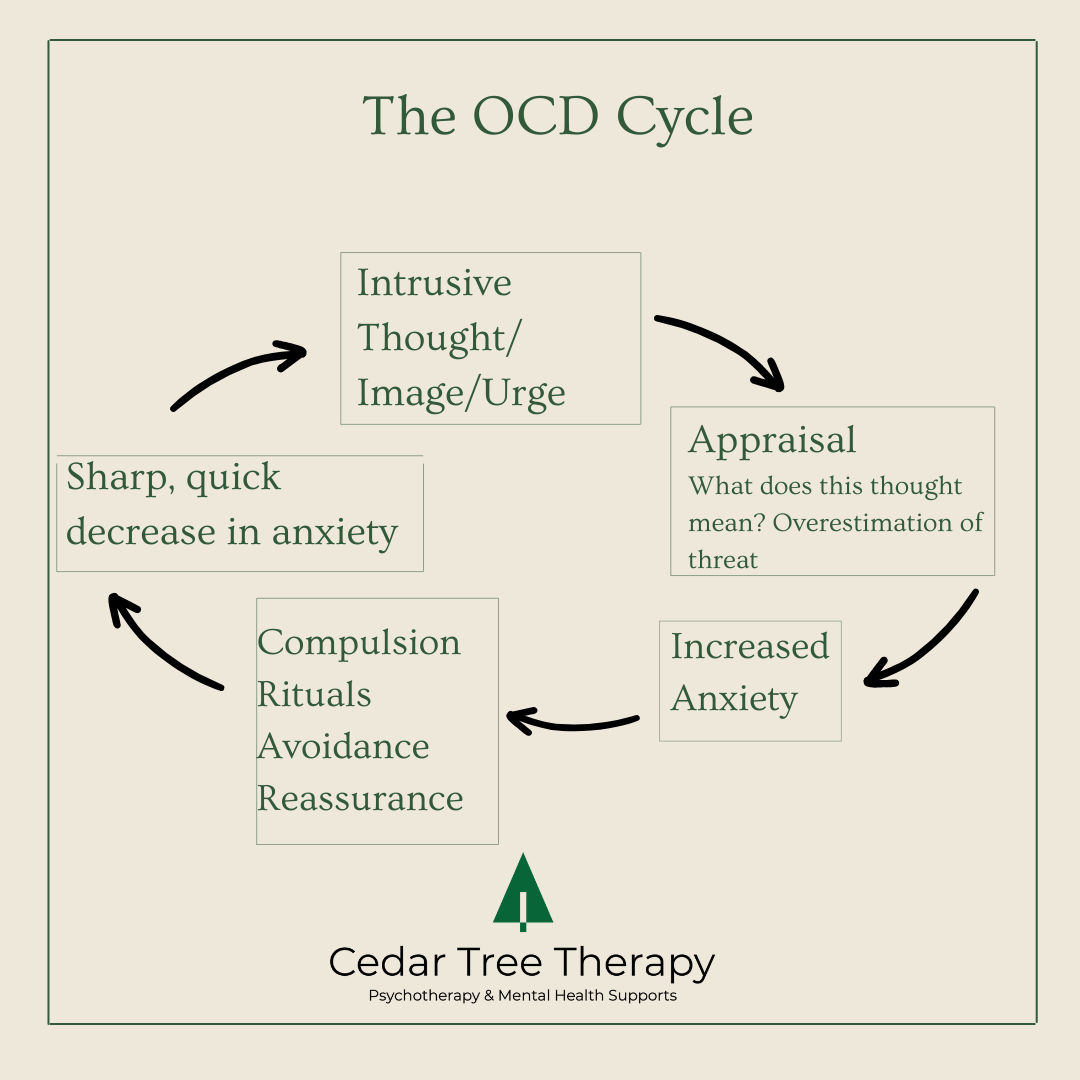How Occupational Therapists Can Use ERP to Help with Obsessive-Compulsive Disorder (OCD)
Understanding OCD and Its Impact
Obsessive-Compulsive Disorder (OCD) is a mental health condition characterized by unwanted, intrusive thoughts (obsessions) and repetitive behaviors or mental acts (compulsions) aimed at reducing anxiety or preventing a feared outcome. These symptoms can significantly interfere with daily routines, relationships, and quality of life.
Occupational Therapists play a vital role in the treatment of OCD—especially through the use of Exposure and Response Prevention (ERP), one of the most evidence-based treatments for OCD.
What Is Exposure and Response Prevention (ERP)?
ERP is a specialized form of Cognitive Behavioural Therapy (CBT) designed to help individuals gradually face their fears and resist the urge to engage in compulsions. The emphasis on this type of therapy is the behavioural component. Over time, this process helps the brain learn that anxiety naturally decreases without performing the rituals.
For example, someone who fears contamination might work toward touching a doorknob and refraining from washing their hands immediately afterward—under the supportive guidance of their therapist.
How Occupational Therapists Integrate ERP Into Practice
Occupational therapists are uniquely positioned to integrate ERP within the context of a person’s daily life and functional goals. Here’s how Occupational Therapists can effectively support clients with OCD:
1. Functional Assessment of Triggers
Occupational Therapists begin by understanding how obsessions and compulsions affect self-care, productivity, and leisure. For example, an individual might spend hours engaging in compulsions, struggle to complete work tasks due to intrusive thoughts, or avoid social situations out of fear their obsession might come true.
This holistic assessment helps tailor ERP exposures that are person-centered and directly related to meaningful life activities.
2. Graded Exposure Plans
Occupational Therapists collaborate with clients to design graded exposure hierarchies—lists of feared situations ranked from least to most distressing.
Some examples of behavioural exposures:
Touching an item perceived as “dirty” without immediately washing.
Leaving home without checking locks multiple times.
Using public restrooms or touching shared objects.
Through structured ERP sessions, the Occupational Therapist supports the client in approaching anxiety-provoking tasks safely and gradually, helping them regain confidence in everyday occupations. It is important to note that your therapist works through your hierarchy at your pace. Although it may feel challenging it should never be incredibly distressing. Your feedback throughout is important.
3. Response Prevention Strategies
In addition to exposure, Occupational Therapists integrate response prevention—refraining from performing compulsions such as handwashing, checking, or seeking reassurance.
The Occupational Therapist provides emotional regulation tools, grounding techniques, acceptance and mindfulness strategies to tolerate the discomfort that arises during exposure.
4. Building Daily Routines and Coping Skills
ERP alone is most effective when combined with occupational therapy’s focus on functional recovery. Occupational Therapists help clients rebuild balanced routines, improve sleep, eating, and self-care, and engage again in valued activities that OCD may have disrupted.
5. Collaborative, Holistic Care
Occupational therapists often work alongside psychologists, psychiatrists, and family members to ensure a coordinated approach. The Occupational Therapist’s focus on participation, autonomy, and quality of life helps bridge the gap between clinical progress and real-world functioning.
Benefits of ERP With an Occupational Therapist
Personalized treatment focused on your daily life and goals.
Supportive, practical guidance during real-world exposures.
Improved independence in home, work, and social settings.
Long-term anxiety reduction and increased tolerance for uncertainty.
Key Takeaway
ERP is one of the most effective, research-supported treatments for OCD—and occupational therapists are uniquely equipped to deliver it within the context of everyday living. By addressing both the emotional and functional aspects of OCD, OTs help clients reclaim their routines, relationships, and sense of control.
Frequently asked questions (FAq)
1. What is ERP therapy for OCD?
Exposure and Response Prevention (ERP) is a form of CBT that helps people face their fears and reduce compulsive behaviours by gradually exposing them to anxiety triggers without performing rituals.
2. Can occupational therapists provide ERP for OCD?
Yes. Occupational Therapists trained in mental health can integrate ERP techniques to help clients manage OCD symptoms while improving participation in daily activities.
3. How is ERP with an Occupational Therapist different from ERP with a general therapist?
While both use evidence-based ERP methods, Occupational Therapists focus on function and daily living, helping clients apply ERP skills in real-world contexts such as hygiene routines, work tasks, and social interactions. Its not just talking, we bring therapy to life.
4. How long does ERP treatment take?
ERP is typically delivered over several months to a year or more, depending on symptom severity and readiness for exposure. Progress is gradual but highly effective with consistent participation.
5. Is ERP effective for all types of OCD?
Yes. ERP has strong research support across various OCD presentations, including contamination fears, checking, intrusive thoughts, and symmetry obsessions.
Want more information about therapy for OCD? Check out this past blog post:











